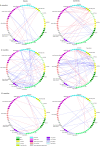Associations Between Serum Fatty Acids and Immunological Markers in Children Developing Islet Autoimmunity-The TRIGR Nested Case-Control Study
- PMID: 35693790
- PMCID: PMC9175567
- DOI: 10.3389/fimmu.2022.858875
Associations Between Serum Fatty Acids and Immunological Markers in Children Developing Islet Autoimmunity-The TRIGR Nested Case-Control Study
Abstract
Aims: Altered immune functions as well as fatty acid intake and status have been associated with the development of type 1 diabetes. We aimed to study the relationship between fatty acids and immunological markers in young children with increased genetic risk for type 1 diabetes in order to define putative mechanisms related to development of islet autoimmunity.
Methods: Serum samples for fatty acid and immunological marker measurements were obtained in the Trial to Reduce IDDM in the Genetically at Risk (TRIGR) ancillary study (Divia) from children born between 2002 and 2007 in 15 countries. Case children (n = 95) were defined as having repeated positivity for at least two out of four diabetes-associated autoantibodies. For each case child, control children were selected matched for country and date of birth (n = 173). Serum fatty acids and immunological markers were measured from cord serum and at the age of 6 and 12 months. Spearman correlation coefficients were calculated between fatty acids and immunological markers.
Results: Correlations between circulating fatty acids and immunological markers were different in case children who developed islet autoimmunity than in control children already at birth continuing across the first year of life. In case children, saturated fatty acids (SFAs) showed stronger correlations with immunological markers, while in controls, polyunsaturated fatty acids (PUFAs) showed stronger correlations.
Conclusions: In cases, SFAs were associated with several immunological markers (CXCL10, IL-6, IL-9, IL-17, and CM-CSF) previously linked to the type 1 diabetes disease process. Findings indicate that fatty acids could have immunomodulatory potential in the early phase of the disease development, although causality between fatty acids and the immunological pathways remains to be explored.
Trial registry number: NCT00179777.
Keywords: chemokines; children; cytokines; fatty acids; growth factors; immunological markers; islet autoimmunity; type 1 diabetes.
Copyright © 2022 Niinistö, Miettinen, Cuthbertson, Honkanen, Hakola, Autio, Erlund, Arohonka, Vuorela, Härkönen, Hyöty, Krischer, Vaarala, Knip, Virtanen and TRIGR Investigators.
Conflict of interest statement
The authors declare that the research was conducted in the absence of any commercial or financial relationships that could be construed as a potential conflict of interest.
Figures

References
-
- Nicoletti F, Conget I, Di Mauro M, Di Marco R, Mazzarino MC, Bendtzen K, et al. . Serum Concentrations of the Interferon-Gamma-Inducible Chemokine IP-10/CXCL10 Are Augmented in Both Newly Diagnosed Type I Diabetes Mellitus Patients and Subjects at Risk of Developing the Disease. Diabetologia (2002) 45:1107–10. doi: 10.1007/s00125-002-0879-5 - DOI - PubMed
Publication types
MeSH terms
Substances
Associated data
Grants and funding
LinkOut - more resources
Full Text Sources
Medical

